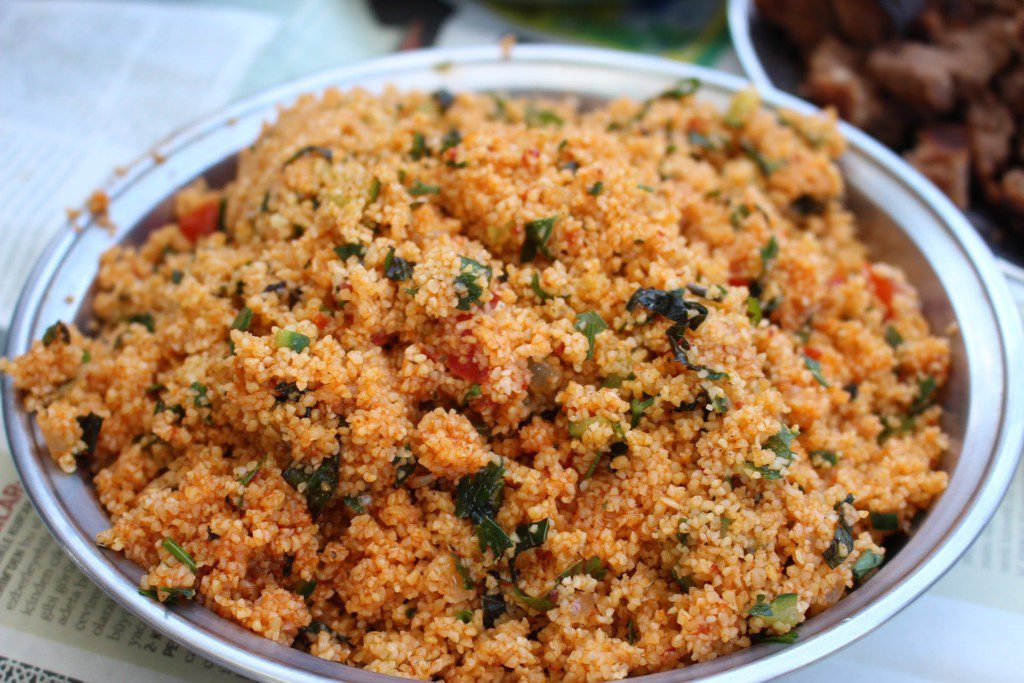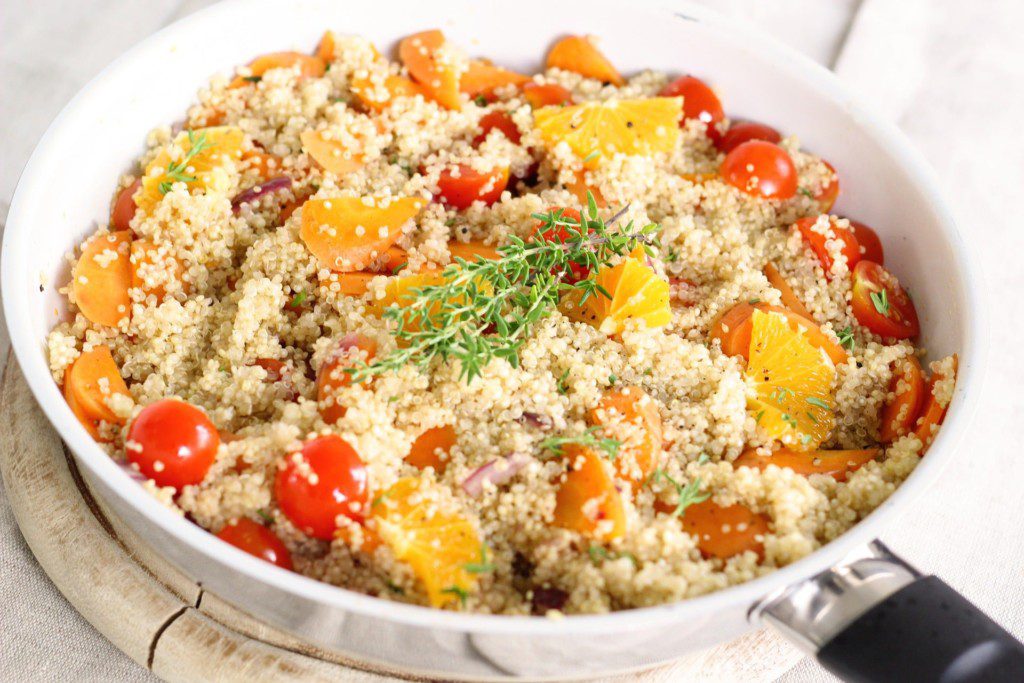Bulgur wheat and quinoa are both grains which hold a special status in the health food lover’s club, and for good reasons. These two are essentially two different grain types – bulgur and quinoa and have noticeable differences in the properties they hold. Even though quinoa are actually seeds, they are often referred to as grains.
When it comes to bulgur wheat vs. quinoa or simply bulgur vs. quinoa, let us have a look at the notable differences.
Table of Contents
Bulgur Wheat Vs Quinoa – What Is The Difference?
Bulgur or quinoa–what are these food items, and what are the fundamental differences between them? Quinoa and bulgur are both popular grains and are extremely popular among diet enthusiasts and diet specialists–these are foods that scream the modern way of living by eating healthy.
Be it quinoa or bulgur, they add taste and volume to a dish and make one feel full, without adding too many calories. Quinoa and bulgur wheat are both varieties of wheat, which have quite a lot of similarity in size and texture and even absorb flavors quickly.
Let us talk about bulgur wheat vs. quinoa and know more about these grains.
What Is Bulgur Wheat?

Bulgur is derived from cracked wheat, which in turn, is derived from the bulgur plant, but is bulgur healthy? First and foremost, bulgur makes a great addition to the food items like vegetable burgers, salads, stews, etc. Bulgur is usually available for consumption in pre-roasted form.
Related Reading:
To ease your decision about which quinoa brand to buy. We reviewed and tasted multiple brands of quinoa to come up with our best recommendation.
Bulgur Wheat Calories And Nutrition
1. Is bulgur wheat healthy?
Approximately 151 calories are present in bulgur wheat, which is relatively lesser in amount compared to the regular wheat that is available in the market for consumption. This very fact makes bulgur wheat a much healthier choice. The long-term use of bulgur in diet will certainly have some beneficial impact on the health and digestion.
2. Is bulgur wheat good for weight loss?
Yes, especially for people who want to lose weight fast and acquire a healthy diet without losing on the flavor of food.
A cup of cooked Bulgur wheat provides 6 grams of protein, 0 grams of fat, 8 grams of fiber, folate, vitamin B6, niacin, iron, manganese and magnesium. (1)
3. Is bulgur good for you?
When it comes to bulgur nutrition, it can be said that bulgur is one of the best options for people who are switching to alternative, healthier diets, such as vegan or vegetarian diets. As a matter of fact, both bulgur and quinoa are healthier alternatives for a more beneficial diet.
Bulgur Wheat Benefits
1. Is bulgur wheat good for you?
Bulgur wheat is one of the most minimally processed grain that one can find commercially for regular consumption. Let us look at the health benefits and advantages that bulgur has to offer:
- Bulgur is free from fat and cholesterol.
- Bulgur is high in fiber content and has a relatively low sodium content.
- Bulgur happens to be a rich source of vital nutrients, such as phosphorus, manganese, and selenium. It is full of essential vitamins as well.
- Bulgur is healthy for the heart for the same reason mentioned above–it has no fats or cholesterol content, which makes it ideal for losing excessive and unwanted fat from the body.
- Bulgur provides the body with essential iron. This helps combat iron deficiency and low HB related issues such as anaemia.
- Bulgur promotes the growth of healthy gut bacteria and also greatly improves the overall process of metabolism.
What Is Quinoa?

Essentially, quinoa (Pronounced as ‘Keen-wah’) is a pseudo-cereal that quite naturally happens to be one of the most popular foods in the world. Quinoa are actually seeds from the amaranth family. It is a top favorite among health-conscious people who want to keep their diet in check. In fact, quinoa is available as a product in numerous health and medical shops because it often is very popular as a dietary component that promotes weight loss and other benefits for an individual’s health.
Related Reading:
Bored with similar ways to cook quinoa? Here we listed different ways of cooking with quinoa to enhance your taste palate.
Quinoa Calories And Nutrition
One cup of cooked quinoa contains 222 calories. As quinoa is high is fibre and has a low glycemic index, quinoa is widely consumed by people on a weight loss diet.
According to USDA, 100 grams of quinoa contain 4.4 grams of protein, 0.9 grams of sugar and 2.8 grams of fibre. It is also a rich source of many vitamins and minerals like manganese, iron, folate, zinc, copper and phosphorous.
Benefits of Quinoa
- Quinoa is a gluten-free pseudo-cereal. This makes it one of the topmost choices for people who are allergic to gluten, or any component that is derived from gluten.
- The nutrient content of quinoa, including potassium, iron, zinc, and several others, makes it a top contender for those people who claim to be the more health-conscious ones.
- The high fiber content of quinoa makes it easily digestible and promotes easy movement of bowel.
- All the essential amino acids are present in quinoa – all these are components that are essentially derived from plants and is a plant-based food, quinoa is completely organically sourced which can be used as the central or side ingredient in several kinds of dishes and preparations in general.
Related Reading:
We reviewed India Gate Quinoa and here’s what we concluded.
Bulgur Wheat Vs Quinoa – Can You Substitute Them For Each Other?
1. Can bulgur substitute quinoa or the other way around? Can Quinoa substitute bulgur?
Well, people prefer one over the other as per their personal preferences–be it quinoa or bulgur, both are healthy and nutritionally important in their own ways. As discussed above, the benefits of bulgur wheat are, in fact, innumerable, and when it comes to bulgar substitution, quinoa is the first choice that comes to mind. Quinoa is one of the healthiest bulgur substitutes one could opt for.
2. How about using cracked wheat (daliya) as a substitute?
Quinoa is known for the nutty flavor and the crunchy taste that it has to bring to the table. When it comes to cracked wheat vs. quinoa, quinoa’s nutritional content is much higher.
Wrapping Up!
To conclude, it can be said that when it comes to bulgar wheat vs quinoa, both bulgur and quinoa hold their places of importance in maintaining a healthy diet.
Frequently Asked Questions
After a long discussion on the difference between bulgur wheat and quinoa, here we have answered a few interesting FAQs about the same.
1. Is wheat and quinoa good for weight loss?
Being rich in fiber, both wheat and quinoa are good for weight loss. As they improve metabolism and thus help in weight management.
2. Can quinoa be eaten before going to the gym?
Quinoa, being a good source of carbs and protein, turns out to be a good option to fuel your body, whether it is before or after the gym.
3. Is wheat the best alternative to quinoa?
If your food preference is gluten-free, then replacing quinoa with wheat would not be a great idea, as wheat has gluten.
Instead of wheat, you can replace quinoa with millet and buckwheat.


